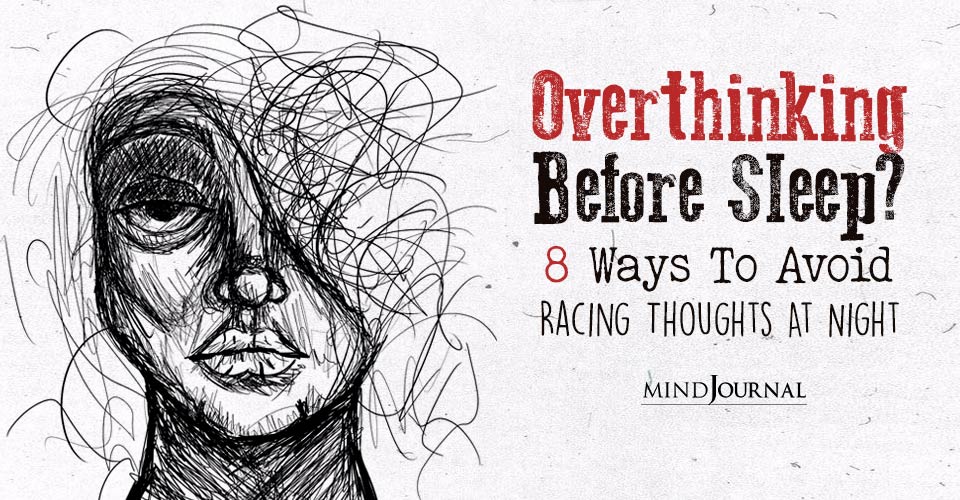Can’t sleep at night? Overthinking keeping you up? Racing thoughts at night can totally screw up your sleep schedule and lead to insomnia. If you are struggling with sleepless nights and wondering how to stop overthinking at night, then we are here to help.
When your mind is on a race track
It’s been a long, hard day. You are tired, exhausted and ready to hit the sack. As you lie in your bed and slide under your warm, cushy blanket, you can’t wait to fall asleep. The room is dark and the temperature is just right. You exhale deeply as you relax and that’s when it happens.
BANG!
The starting pistol fires and your mind races through the track of rumination and painful memories of the past. You try to shake it off, clear your mind and focus on getting some much needed sleep. But nope. Your mind is on steroids tonight it seems as intrusive & repetitive thoughts are keeping you up. The harder you try to sleep, the worse it gets. And before you know it, it is almost dawn and you need to wake up in another hour for another long, hard day.
Related: 13 Terrifying Health Effects of Sleep Deprivation
Sounds relatable? Racing thoughts at night can be a really difficult and stressful experience, especially if it occurs almost every single night. Night time overthinking can be really hard to control and it can make falling asleep an excruciating experience. Sadly, the harder we try to shut down our mind and force ourselves to fall asleep, the louder our mental chatter becomes and the more awake and alert we get.

Racing thoughts can often be a sign of anxiety or other underlying psychological conditions. The stress and anxiety we experience throughout the day can wreak havoc at night as we review our day mentally and plan for the day ahead. During this process, our monkey mind takes a trip down memory lane to dig up some buried embarrassing moments from the past just to make things a little more fun.
Remember that embarrassing thing you did in high school? Yeah, that’s a super burn for all of us. And so as anxiety extends its hands for a dance, we tango all night bidding sleep a reluctant goodbye.
So what can you do to avoid overthinking at night? Let’s find out.
How to stop racing thoughts at night
If you are struggling with night time overthinking, here is how to stop overthinking at night –
1. Write it down
If your mind is overwrought with racing thoughts at night, then writing down whatever is bothering you can be an excellent idea to stop overthinking before sleep. Journaling can not only help us manage our tendency to overthink at night and improve our mental health, but it can also help us get better sleep.
Practice journaling for 15-20 minutes each night before sleep by writing down everything that’s on your mind. It is not about finding solutions or planning how to overcome your issues. It is simply about writing down whatever is bothering you. Writing your thoughts and emotions down on a notepad can help you release your stress, anxiety and frustrations from the day. So dump them on your notepad instead of carrying them in your mind when going to sleep.
However, you need to be conscious about the tone of the thoughts you are writing about. If you are journaling about negative thoughts, release those thoughts by setting the right intentions when closing the notepad.
Related: Sleeplessness: 10 Signs, Causes And Tips To Sleep Better
One 2017 study suggests that writing a specific to-do list about incomplete future tasks for five minutes at bedtime can help improve sleep quality and quantity. “Writing about one’s worries can help individuals fall asleep,” explain the researchers. In the battle between journaling and overthinking, journaling always wins and rewards you with a restful sleep.
2. Make time to wind down & relax before sleep
If you want to stop racing thoughts at night then you need to have a wind down routine that helps you calm down and feel relaxed before sleep. Start your wind down ritual at least 60-45 minutes before bedtime on a daily basis. Make this a habit as repetition will make your brain associate this routine with sleep.
A wind down routine will promote the activation of the alpha brain waves that are released when you are in wakeful relaxation. Alpha brain waves are important for the early phase of sleep.
In case you are unable to manage 45 minutes for winding down, focus on doing 2-3 things that help you relax, like meditating or listening to soothing music. Avoid doing things that can further stimulate your brain during this period like scrolling through your phone. Reading a book can be recommended but avoid titles with stories that are too exciting and may keep you up.

Related: Struggles Of An Overthinker: 18 Things Only They Understand
3. Practice meditation before sleep
One of the simplest, most effective and best ways to overcome racing thoughts at night is to meditate before bed. Meditation can help you decompress, be more self-aware, mindful, relaxed and calmer.
Studies have found that meditation can help to make the mind calmer & more mindful and can significantly improve sleep quality. According to a 2015 study, mindfulness meditation can “remediate sleep problems among older adults in the short term, and this effect appears to carry over into reducing sleep-related daytime impairment that has implications for quality of life.”
It can even prove helpful for people who have never meditated before. Simply close your eyes, relax your body, take a few deep breaths and bring your attention to your breaths. Allow different thoughts to appear, acknowledge them and let them go. Do not hold on to anything. In case your mind wanders away, bring your awareness back to your breath. It’s that easy.
You can even try guided meditation that is freely available on YouTube or listen to some calming music to avoid racing thoughts at night while you meditate.
4. Disconnect from your devices
Do AIs dream of virtual sheep? Who knows. And you don’t have to find out either. Put your phone down before going to bed if you don’t want racing thoughts at night. Screens in your smartphone, tablet, laptop or any other device emit blue light which is a fragment of the natural electromagnetic energy spectrum. And this blue light can seriously affect our cognitive process and alertness leading to racing thoughts at night and mess with our sleep.
Researchers claim that “The use of light-emitting electronic devices before bedtime may contribute to or exacerbate sleep problems.”
While this blue light can improve your mood, it can also negatively affect your melatonin production by boosting your alertness and messing up your circadian rhythm – the natural sleep-wake cycle of the human body. “Blue light from electronic devices has a bad reputation. It has a wavelength which may influence our circadian rhythm and cause bad sleep,” explains a 2022 study.
Related: 14 Things Overthinkers Will Understand
Moreover, social media use at night can also lead to higher stress levels & anxiety and aggravate mental health problems causing overthinking before sleep.
So avoid working on your computer or unnecessarily scrolling through your phone at least one hour before bedtime. Disconnect from social media and put your work aside as you have done enough for today and you can always pick it up tomorrow. Instead focus on relaxing, resting and avoiding racing thoughts at night.
5. Don’t “try” to sleep
Don’t be desperate to fall asleep and don’t force yourself to sleep as it can lead to further racing thoughts at night. Sleep is a natural experience and the harder you try to control it, the worse the experience will be for you. “Trying” too hard to sleep will make you anxious and cause overthinking before sleep, making your mind active instead of calm.
This is why you need to focus on relaxation and practice techniques that allow your body and mind to relax and decompress. The more you put pressure on yourself to fall asleep, the more you will struggle with getting good quality, uninterrupted sleep. Instead be more mindful about intrusive, unwanted and racing thoughts at night, observe & acknowledge them and let them go. This will make your mind calmer and help you sleep better.

6. Get out of your bed and try to stay awake
Can’t sleep? Racing thoughts at night keeping you up? Wondering how to stop overthinking at night and get some sleep? STOP trying to sleep, get out of bed and try to stay awake instead. Sounds crazy, but it works. When you think too much about sleep and become desperate for it, you only prepare yourself to overthink and stay awake.
Trying to sleep never works as it is a form of paradoxical thinking. And this is why, trying to stay awake can make you fall asleep faster.
Related: How Overthinking Affects Your Life (and 6 Ways To Stop)
When you try to stay awake, your frustration and anxiety about sleeping reduces, making you calmer and more relaxed. In fact, getting out of bed, when your thoughts are wreaking havoc inside your mind for over 20 minutes, can also be a great way to overcome overthinking and sleeplessness.
While you are out of your bed, keep your bedroom dimly lit, write down your thoughts about the present moment in your notepad and release them by closing your journal. Engage in some relaxing activities like meditation and then go back to bed when you start feeling sleepy again. Relax mindfully by focusing on your breath and allowing yourself to sleep. This can prove to be more effective than lying on your bed and worrying about falling asleep.
7. Practice deep breathing
Breathing exercises are a great way to get rid of overthinking and racing thoughts at night. Deep breathing is a powerful technique for controlling your thoughts and calming your mind. Studies have found that deep breathing or diaphragmatic breathing can help to manage negative thoughts & emotions and stress levels. Researchers further add that “deep breathing technique is capable to induce an effective improvement in mood and stress.”
The 4-7-8 deep breathing method has been found to promote sleep & relaxation and reduce overthinking before bedtime. All you need to do is –
- Breathe in through your nose for a mental count of 4
- Hold your breath for a count of 7
- Breathe out through your mouth for a count of 8
Always make sure to exhale for a longer period of time than you inhale. If your mind starts to wander off, bring your focus back to your breathing. You can try this relaxation exercise for 10 minutes every night before sleep.
8. Distract your mind
While the techniques above can certainly help you avoid racing thoughts at night, there will be times when you won’t be able to shake intrusive thoughts no matter how hard you try. While these extreme experiences will be few and far between, they will still occur and the best technique to deal with them is to distract your brain from these thoughts.
Instead of getting caught up in overthinking, deliberately shift your focus and think about something more positive. Let your thoughts be invested in things that make you feel happy, like your interests or a story or movie you liked. However, whatever you think about should not be of any importance to you so that your brain doesn’t hold on to that specific thought. You can also daydream about something as long as it is unimportant and fun.
Related: 8 Signs You’re An Overthinker (Even If You Don’t Think You Are!)
Another helpful strategy is making up purposeless mental lists, such as a list of your favorite superheroes or your favorite musicians. However, do not get overly serious about these lists as it is only a tool for distraction from having racing thoughts at night. And if nothing seems to work, simply try the old-school and proven counting sheep strategy. You will be snoring before you can count 50.

12 More ways to stop overthinking before sleep
Here are some other ways to stop racing thoughts at night from ruining your sleep –
Make sure your bedroom has the right temperature and is neither too cold nor too warm.
Follow a consistent sleep schedule and good sleep hygiene
Practice yoga regularly for improving sleep quality
Get some exposure to sunlight on a daily basis and make sure your bedroom is dark when going to sleep
Do not look at the clock to know the time if you wake up in the middle of the night as it can result in sleeplessness and anxiety
Although short daytime naps can be beneficial, napping during the day due to sleeplessness caused by racing thoughts at night can lead to chronic insomnia
Follow a healthy diet and eat nutritious food. Make sure your meals are high in protein, carbs and fat for a better sleep
Listen to some soothing and relaxing music, like LoFi tracks, as it can help you calm down and relax before bedtime and avoid overthinking
Use essential oils and aromatherapy to promote relaxation and sleep faster
Avoid excessive consumption of caffeine, alcohol, cigarettes and other drugs as it can cause stress, overthinking and insomnia
Use supplements and sleep aids that can improve your sleep quality such as L–theanine, Magnesium, GABA (gamma-aminobutyric acid), Amino acid 5-HTP and Melatonin
Consult a healthcare professional if your issues persist more than two weeks as it may be caused by some underlying physical or mental health condition
Why do you have racing thoughts at night?
Now that you know how to stop racing thoughts at night, let us understand why this happens in the first place as it will help us better to manage our anxious thoughts that creep up as soon as it’s bedtime.
The human brain is primarily an information processing machine that breaks down, understands and stores all the information it receives throughout the day. “The brain works like a big computer. It processes information that it receives from the senses and body, and sends messages back to the body,” explain researchers. Thanks to our brain, we are capable of thoughts and experience emotions conjured up by those thoughts.
With our lives being extremely fast-paced and hectic nowadays and our lifestyle being in complete disarray, the brain is unable to get any time to process everything. Sadly, the only time our brain gets to process the innumerable information thrown at it during the day is when we go to bed and finally rest our mind to fall asleep. So when we have racing thoughts at night, it is simply because our brain is mainly trying to process and store information so that we can make better decisions.
Every single day we encounter tons of new information with very limited downtime in between for the brain to process all that information. And our brain needs some gaps between receiving information so that it can effectively process the thoughts we have throughout the day.
Related: 11 Mental Tricks To STOP Overthinking
Overthinking at night is how our brain tries to make sense of all the stress and chaos we went through during the day. However, people with high levels of anxiety and anxiety disorders are more prone to having racing thoughts at night. Moreover, chronic or uncontrollable stress over a period of time may also contribute to overthinking before bedtime, even in individuals not experiencing anxiety or related mental health conditions.
Hence, situations that lead to high levels of stress, such as breakups or divorce, grief, job loss, financial instability or deadlines at work often lead to overthinking and insomnia. Regardless of the actual cause, overthinking at night can be a serious health issue that can negatively affect your career, relationship, social and personal life, if left unaddressed.

This is why mindfulness meditation is such a helpful strategy to calm your mind before sleep. Scheduling a little bit of downtime each day to experience calm and mindfulness can allow your brain the time to process the information so that it does not run a race every night.
Sleep well tonight
You deserve to get some good sleep tonight. Well, you deserve to sleep better every night. You have earned it. All you need to do now, is follow the tips mentioned above and if you are still unable to stop racing thoughts at night, make sure to talk to a professional.
Almost all of us experience overthinking before sleep from time to time. But if it happens too frequently and if it goes out of your control, then it can become a serious issue. However, it can be managed and overcome easily with a little effort. The helpful tools we have discussed here will empower you to build better sleep habits and a more positive lifestyle that improves your sleep and reduce racing thoughts and insomnia.
So turn off your device. Turn the lights off. Take a few deep breaths. And just relax.
Let the sandman come to you, sprinkle some sand in your eyes and take you off to dreamland.
Good night!
Related: How To STOP Overthinking As A Highly Sensitive Person











Leave a Reply